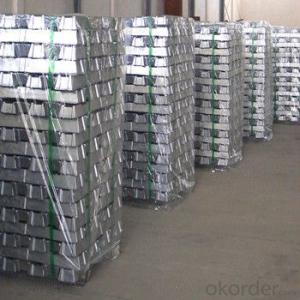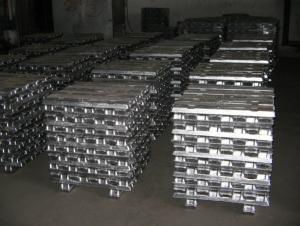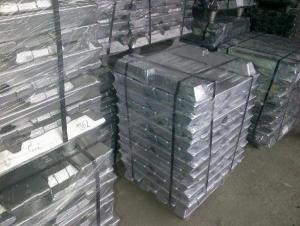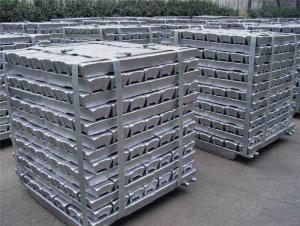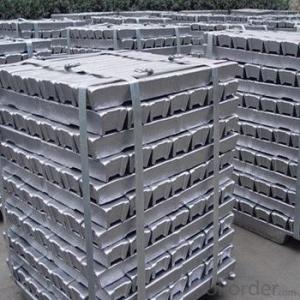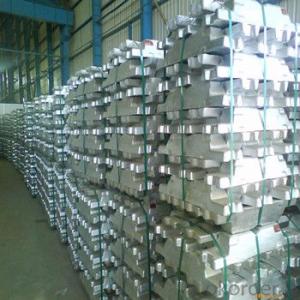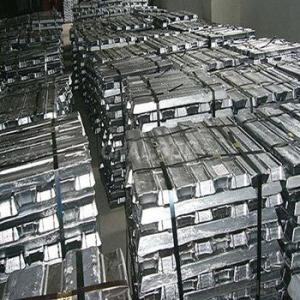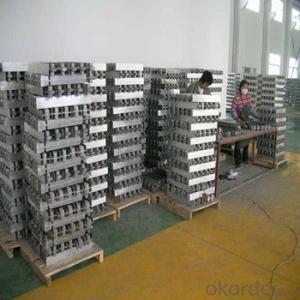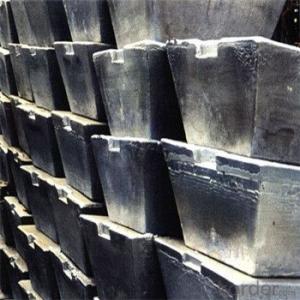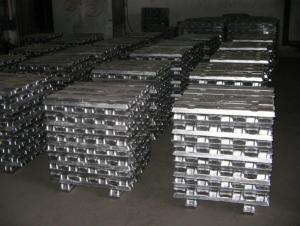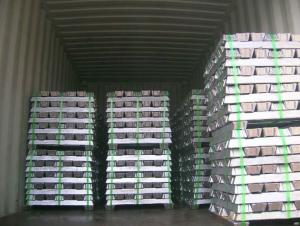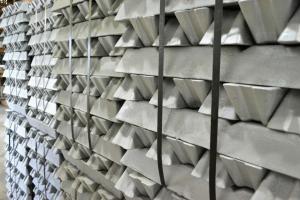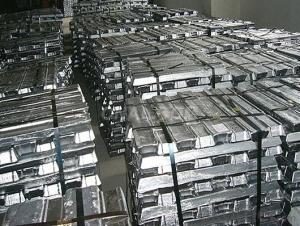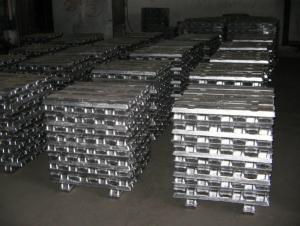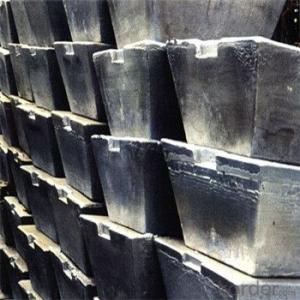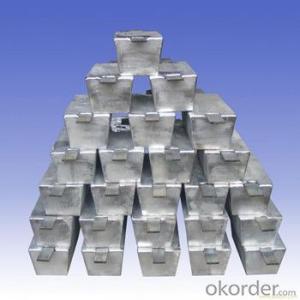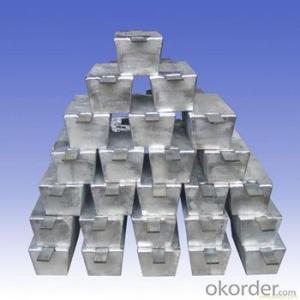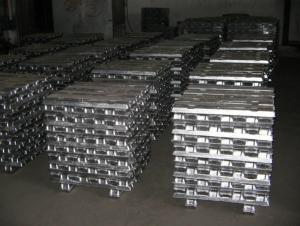Aluminum Ingot 99.7 From Factory Wholesale Pure
- Loading Port:
- China main port
- Payment Terms:
- TT OR LC
- Min Order Qty:
- 1000 m.t.
- Supply Capability:
- 10000 m.t./month
OKorder Service Pledge
OKorder Financial Service
You Might Also Like
Pure Aluminum Ingot Used for Industry
1.Structure of Aluminum Ingot Description
A material that has been cast into a shape in order to be transported and processed easier than in an unprocessed form. An ingot is typically rectangular in shape, which allows it to be stacked. Ingots are most commonly associated with metals, with ingots of gold held in the vaults of banks and brokerages being popular images.
2.Main Features of the Aluminum Ingot
•High Purity
•High strength
•Fast melting
•Best price
•Good after-service
3. Aluminum Ingot Images
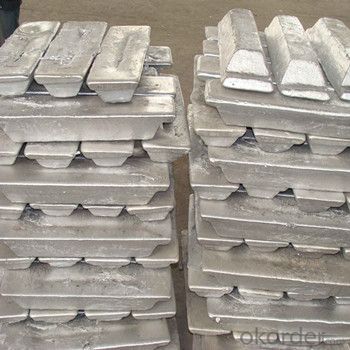
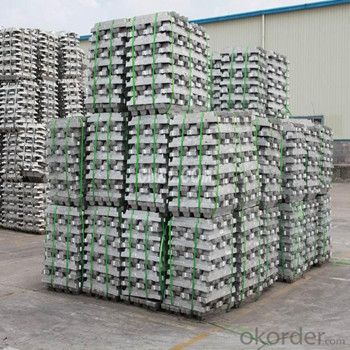
4. Aluminum Ingot Specification
Grade | Chemical Composition % | |||||||||
Al≥ | impurities ≤ | |||||||||
Si | Fe | Cu | Ga | Mg | Zn | Mn | others | Sum | ||
Al99.9 | 99.90 | 0.50 | 0.07 | 0.005 | 0.02 | 0.01 | 0.025 | - | 0.010 | 0.10 |
Al99.85 | 99.85 | 0.80 | 0.12 | 0.005 | 0.03 | 0.02 | 0.030 | - | 0.015 | 0.15 |
Al99.7 | 99.70 | 0.10 | 0.20 | 0.010 | 0.03 | 0.02 | 0.030 | - | 0.030 | 0.30 |
Al99.6 | 99.60 | 0.16 | 0.25 | 0.010 | 0.03 | 0.03 | 0.030 | - | 0.030 | 0.40 |
Al99.5 | 99.50 | 0.22 | 0.30 | 0.020 | 0.03 | 0.05 | 0.050 | - | 0.030 | 0.50 |
Al99.00 | 99.00 | 0.42 | 0.50 | 0.020 | 0.03 | 0.05 | 0.050 | - | 0.050 | 1.00 |
5.FAQ of Aluminum Ingot
We have organized several common questions for our clients,may help you sincerely:
①How about your company?
A world class manufacturer & supplier of castings forging in carbon steel and alloy steel,is one of the large-scale professional investment casting production bases in China,consisting of both casting foundry forging and machining factory. Annually more than 8000 tons Precision casting and forging parts are exported to markets in Europe,America and Japan. OEM casting and forging service available according to customer’s requirements.
②How to guarantee the quality of the products?
We have established the international advanced quality management system,every link from raw material to final product we have strict quality test;We resolutely put an end to unqualified products flowing into the market. At the same time, we will provide necessary follow-up service assurance.
③How long can we receive the product after purchase?
In the purchase of product within three working days, We will arrange the factory delivery as soon as possible. The pecific time of receiving is related to the state and position of customers.Commonly 7 to 10 working days can be served.
- Q:How are aluminum ingots used in the production of heat sinks?
- Aluminum ingots are melted down and then cast into specific shapes and sizes to create heat sinks. These heat sinks are then used in various electronic devices to dissipate heat and cool down the components, ensuring their optimal performance and longevity.
- Q:Does aluminum ingots produced without aluminum ore belong to metal smelting?
- The production of aluminium ingots without aluminum ore belongs to metal smelting.Without the use of aluminum ore, aluminum is also extracted from the compound and turned into free aluminum
- Q:What are the advantages of using aluminum ingots in the production of packaging materials?
- There are several advantages of using aluminum ingots in the production of packaging materials. Firstly, aluminum is lightweight yet sturdy, making it an ideal choice for packaging materials as it ensures easy handling and transportation while providing protection to the contents inside. Secondly, aluminum is a highly malleable metal, allowing for flexibility in design and customization of packaging shapes and sizes according to specific requirements. Additionally, aluminum is corrosion-resistant, ensuring the durability and longevity of packaging materials, even in harsh environments. Furthermore, aluminum has excellent barrier properties, effectively protecting the packaged goods from moisture, oxygen, and other external factors that could potentially degrade the product quality. Lastly, aluminum is a sustainable material, as it is easily recyclable without losing its properties, contributing to the circular economy and reducing the environmental impact of packaging waste.
- Q:What industries use aluminum ingots?
- Several industries use aluminum ingots due to their versatile properties and wide range of applications. Some of the major industries that extensively rely on aluminum ingots include: 1. Automotive Industry: Aluminum ingots are used in the manufacturing of various automotive components such as engine blocks, wheels, frames, and body panels. Aluminum's lightweight nature, corrosion resistance, and excellent thermal conductivity make it a preferred choice for enhancing fuel efficiency and reducing vehicle weight. 2. Aerospace Industry: Aluminum ingots find extensive use in the aerospace industry for manufacturing aircraft structures, wings, fuselage panels, and other components. Aluminum's high strength-to-weight ratio makes it ideal for building lightweight aircraft that can withstand the stresses and strains of flight. 3. Construction Industry: The construction sector utilizes aluminum ingots for various applications such as windows, doors, roofing, and cladding systems. Aluminum's corrosion resistance, durability, and aesthetic appeal make it a popular choice for modern architectural designs. 4. Packaging Industry: Aluminum ingots are widely used in the packaging industry to produce aluminum foils, cans, containers, and closures. Aluminum's excellent barrier properties, lightness, and recyclability make it a preferred material for preserving and protecting food, beverages, pharmaceuticals, and other perishable items. 5. Electrical Industry: Aluminum ingots are extensively used in the electrical industry for manufacturing power transmission cables, electrical conductors, and wiring systems. Aluminum's high electrical conductivity, low weight, and cost-effectiveness make it a suitable alternative to copper in many electrical applications. 6. Marine Industry: Aluminum ingots are employed in the marine industry for fabricating boat hulls, masts, decks, and various other components. Aluminum's corrosion resistance, lightness, and durability make it a preferred choice for constructing vessels that can withstand harsh marine environments. 7. Consumer Goods Industry: Aluminum ingots are utilized in the consumer goods industry for manufacturing a wide range of products such as cookware, furniture, appliances, and electronic devices. Aluminum's thermal conductivity, non-toxicity, and recyclability make it a popular material for consumer goods. These are just a few examples of the industries that heavily rely on aluminum ingots. Due to its numerous advantageous properties, aluminum is widely used in various other sectors such as machinery, transportation, energy, and even in art and design.
- Q:Can aluminum ingots corrode?
- Indeed, it is possible for aluminum ingots to experience corrosion. Despite being renowned for its resistance to corrosion, aluminum is not entirely impervious to it. When subjected to specific environments, like those containing high salt or acid concentrations, aluminum can undergo a process known as oxidation. This process gives rise to the formation of a thin layer of aluminum oxide on the surface of the metal, which serves as a safeguard, preventing further corrosion. Nonetheless, if this protective layer becomes damaged or compromised, the underlying aluminum can become vulnerable to corrosive elements, ultimately resulting in corrosion. Consequently, although aluminum ingots generally display resistance to corrosion, it is crucial to exercise proper caution and take necessary measures to shield them in corrosive surroundings.
- Q:What aluminum factories are there in Guangdong and Foshan?
- Cheap comparison, if the quality can price in the medium level, but can be at ease, is called a penny goods.
- Q:What are the different coating processes for aluminum ingots?
- There are several different coating processes that can be used for aluminum ingots. These processes are used to enhance the surface properties of the ingots and provide additional protection against corrosion and other environmental factors. Some of the common coating processes for aluminum ingots include: 1. Anodizing: This is a widely used coating process for aluminum. It involves creating an oxide layer on the surface of the ingots through an electrochemical process. Anodizing provides excellent corrosion resistance and can also enhance the appearance of the ingots by allowing for the application of dyes or paints. 2. Powder coating: In this process, a dry powder is applied to the surface of the aluminum ingots. The ingots are then heated, causing the powder to melt and form a protective coating. Powder coating provides a durable and aesthetically pleasing finish, offering resistance to corrosion, UV radiation, and chemicals. 3. Electrophoretic coating: This process involves immersing the aluminum ingots in a tank containing an electrically charged paint solution. The paint particles migrate and deposit on the surface of the ingots due to the electric field. Electrophoretic coatings offer excellent adhesion, corrosion resistance, and uniform coverage. 4. Chemical conversion coating: This process involves treating the aluminum ingots with a chemical solution that reacts with the surface to form a protective coating. Common chemical conversion coatings include chromate, phosphate, and chromate-phosphate coatings. These coatings provide corrosion resistance and can also serve as a base for paint or other decorative finishes. 5. Thermal spraying: In this process, a coating material is heated and sprayed onto the surface of the aluminum ingots. The coating material can be in the form of powders, wires, or rods. Thermal spraying creates a strong and durable coating that offers protection against wear, corrosion, and high temperatures. 6. Organic coatings: These coatings are typically applied as liquid paints or lacquers onto the surface of aluminum ingots. Organic coatings provide a decorative finish and also offer protection against corrosion and weathering. They are commonly used in applications where aesthetics are important. Each of these coating processes has its own advantages and disadvantages, and the choice of coating process depends on the specific requirements of the aluminum ingots and the intended application.
- Q:How are aluminum ingots used in construction?
- Aluminum ingots are commonly used in construction as a raw material for manufacturing various aluminum products such as beams, frames, panels, and cladding. These ingots are melted and cast into specific shapes to create lightweight, yet strong components that are resistant to corrosion. Aluminum's high strength-to-weight ratio makes it ideal for constructing structures like buildings, bridges, and roofs, as it reduces the overall weight while ensuring structural integrity. Additionally, aluminum ingots are also used for fabrication of windows, doors, and other architectural elements due to their durability, aesthetic appeal, and ability to withstand harsh weather conditions.
- Q:What kind of aluminum consumption does the furnace compare with natural gas?
- Oil burning more intense flame, smelting time will be much shorter than natural gas, this is the car after the gas, power is much better than gasoline. The answer is obvious: the aluminum loss of gas will be greater.
- Q:What is aluminium ingot? Is it different from other series of aluminum?
- The problem lies in the production process, the mold work with a problem, to the mold work belt repair, this you have to let manufacturers solve.
1. Manufacturer Overview |
|
|---|---|
| Location | |
| Year Established | |
| Annual Output Value | |
| Main Markets | |
| Company Certifications | |
2. Manufacturer Certificates |
|
|---|---|
| a) Certification Name | |
| Range | |
| Reference | |
| Validity Period | |
3. Manufacturer Capability |
|
|---|---|
| a)Trade Capacity | |
| Nearest Port | |
| Export Percentage | |
| No.of Employees in Trade Department | |
| Language Spoken: | |
| b)Factory Information | |
| Factory Size: | |
| No. of Production Lines | |
| Contract Manufacturing | |
| Product Price Range | |
Send your message to us
Aluminum Ingot 99.7 From Factory Wholesale Pure
- Loading Port:
- China main port
- Payment Terms:
- TT OR LC
- Min Order Qty:
- 1000 m.t.
- Supply Capability:
- 10000 m.t./month
OKorder Service Pledge
OKorder Financial Service
Similar products
New products
Hot products
Hot Searches
Related keywords
